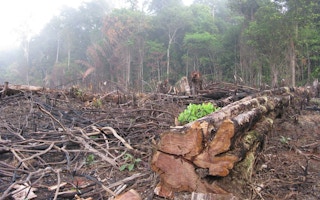According to Brazil’s national space research agency or INPE, almost 6,000 square kilometres of forest in the Amazon river basin was cut down in the 12 months to July 2013. That’s a rise of 28% compared with the previous 12 month period when approximately 4,500 sq.kms. of land was deforested.
The figures, announced as the COP19 climate meeting continues in Warsaw, might have been a source of embarrassment for the Brazilian government. But the Environment Ministry nonetheless had a cheerful headline on its press release: “Amazon deforestation is the second lowest since records began” it said.
Amazon deforestation records have been compiled since 1988, varying widely from year to year. Environmentalists say the changing figures have had more to do with the ups and down of the economy than any specific government actions.
The worst performing states for deforestation in the 12 months to July were Mato Grosso and Pará. The Environment Ministry, in its determinedly upbeat take on the figures, played down the statistics’ importance, saying they only referred to ‘isolated cases’, although Matto Grosso and Para are two of the biggest states in the Amazon basin.
Deforestation in the Amazon region has a considerable impact on the world’s climate: the Amazon forest is a vital carbon ‘sink’, soaking up greenhouse gases.
Greenpeace and other NGOs lay much of the blame on the rise in deforestation on a controversial new forest code, recently approved by Brazil’s Congress. Under pressure from the powerful `bancada ruralista` – the agribusiness lobby – and in defiance of scientific advice, Congress watered down penalties for illegal deforestation and also reduced the size of protected areas. The new code also gives an amnesty to those involved in deforesting forest areas prior to 2008.
Officials Involved
Izabella Teixeira, the Environment Minister, speaking in Warsaw, denied a connection between the approval of the new forest code and the increase in deforestation. Instead she blamed organised crime and the failures of local administrators, both mayors and state governors. She also denied any connection between the deforestation figures and a reduction of the budget of the Brazilian Institute of Environment and Renewable Natural Resources (IBAMA).
“What is happening are crimes, we have 3,921 police investigations, some of them involving civil servants. We are cutting into our own flesh”.
Teixeira said the government has begun to deploy intelligence operations to stop “the mafias involving landgrabbers and civil servants who are stimulating the advance of devastation”.
The Environment Minister criticised NGOs who have come up with even higher figures for Amazon deforestation.
Imazon (the Amazon Institute for Man and Environment), one of the most respected environmental organisations in the Amazon, says its figures reveal that deforestation has risen by more than 90% in an area known as the ‘Arc of Deforestation’ – land that encircles the heart of the rainforest, already occupied by farms, loggers and their roads.
Teixeira said that NGOs used different methodologies to reach their figures and declared that “Brazil’s reality and official data is what INPE says it is.”
The government has stepped up its operations to punish financially those who engage in deforestation activities, launching more than a thousand operations in areas threatened by deforestation and imposing thousands of fines. However, offenders usually appeal and in Brazil’s desperately slow judicial process, cases can take years to be resolved.










